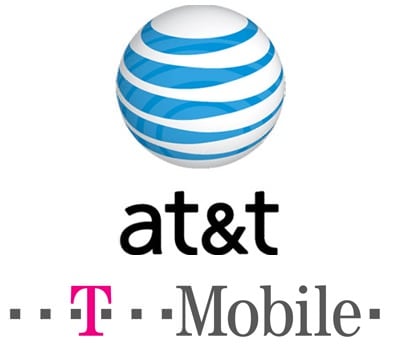Find Our Latest Video Reviews on YouTube!
If you want to stay on top of all of our video reviews of the latest tech, be sure to check out and subscribe to the Gear Live YouTube channel, hosted by Andru Edwards! It’s free!
Monday March 21, 2011 11:35 am
AT&T Buys T-Mobile: Good for AT&T, Bad for Customers

AT&T just announced it will buy T-Mobile USA for $39 billion. If the transaction gets approved by the government and closes in a year as planned, it will create the nation's largest wireless carrier by far.
While this is great news for both companies, it's an awful idea for consumers - and I desperately hope the US antitrust authorities rake this merger over the coals.
An AT&T/T-Mobile merger at least makes more sense than the silly T-Mobile/Sprint idea which was being bandied about. Both carriers use the same technologies: GSM, HSPA+ and LTE. While they're on different frequency bands, radios which use all of the relevant bands are becoming easier to build.
The merger neatly solves T-Mobile's long-term problem of not having enough spectrum for LTE, the 4G technology which will soon be a global standard. It gives T-Mobile's struggling parent, Deutsche Telekom, a gigantic cash infusion. And it lets AT&T once again position itself as the number-one carrier against Verizon Wireless, which leapfrogged AT&T technologically this year with Verizon's 4G LTE launch.
AT&T is ahead of T-Mobile on building LTE. T-Mobile is far ahead of AT&T on building HSPA+, a intermediate 4G technology that fits right between the carriers' existing 3G networks and LTE. Together, they could have a smooth and powerful nationwide network.
AT&T's press release for the merger backs this up. The combined carrier will be able to build out much more LTE Than AT&T could alone, by combining AT&T's 700 Mhz spectrum with T-Mobile's AWS spectrum.
For stockholders, this all sounds great. With reduced competition and the efficiencies of a combined network, the new company will probably be quite profitable.
For phone owners, tech lovers, and American consumers, this is a total disaster.
Rates Will Rise, Customer Service Will Drop
Let's start with a basic fact: less competition always results in higher prices than you would have had otherwise. T-Mobile has always been a value leader, offering low prices and some innovative plans, such as its Even More Plus plans which gave monthly discounts in exchange for paying the full up-front price for phones. These plans will go away and the combined carrier will normalize at AT&T's higher rates.
In AT&T's press release for the merger, the company doesn't bother to rebut this idea. Rather, the carrier says there's already plenty of competition and implies that prices are so low that Americans shouldn't be too concerned. AT&T also shows a disingenuous chart explaining that prices dropped when carriers merged over the past ten years. Of course, it doesn't show what would have happened to prices if those carriers hadn't merged.
This merger also means less phone choice for US consumers. Unlike in most other countries, the American phone market is dominated by the carriers; the carriers have to approve and sell most phones. The process of making it through approval labs, and the space on carrier store shelves, limit the number of phones each carrier can handle at once. I'm pretty sure that the number of phones carried by AT&T/T-Mobile will be less than the current number carried by the two carriers separately, because they will want to create efficiencies and unify their product lines.
This doesn't mean T-Mobile's phones will go away - I see the merged carrier cherry picking an iPhone here, a MyTouch 4G there. But it means that there will be fewer choices overall for American consumers, and fewer chances for new manufacturers or ideas to appear in the marketplace.
From a customer service perspective, make no mistake, AT&T will subsume T-Mobile. The merged carrier will not have T-Mobile's friendliness, nimbleness, or level of customer service. Just like in the horrifying Sprint-Nextel mess or during the long, slow, grinding AT&T/Cingular merger, the merged carrier will sink to the minimum customer service level of its parts.
I've sung this song before. I don't see how the biggest carriers getting bigger improves anything for consumers. We've seen many times around the world how duopolies or cozy tri-opolies can retard innovation and drag up prices (hello, Canadians!) and the US government should do everything in its power to prevent the US wireless market from becoming wholly owned by AT&T and Verizon Wireless.
Short of killing this merger entirely, I'm not sure what the government could do to maintain competition here. AT&T and T-Mobile are the only major GSM carriers; everybody else is CDMA. That means if the government forced the merged carrier to divest some markets to be picked up by someone else, the buyer of the divested markets won't be able to integrate them easily into its existing network.
If this merger goes through, it only becomes more urgent for MetroPCS, Cricket and US Cellular to band together into a new, single low-cost force in the wireless market. Together, the three carriers would have around 20-21 million users. They all use the same CDMA technology, and their spectrum holdings largely don't overlap. A new nationwide value leader could help reduce the negative effects of this merger for US consumers.
What do you think of this news? Tell me in the comments below.
This article, written by Sascha Segan, originally appeared on PCMag.com and is republished on Gear Live with the permission of Ziff Davis, Inc.
Latest Gear Live Videos
Advertisement
Advertisement
Advertisement
© Gear Live Inc. {year} – User-posted content, unless source is quoted, is licensed under a Creative Commons Public Domain License. Gear Live graphics, logos, designs, page headers, button icons, videos, articles, blogs, forums, scripts and other service names are the trademarks of Gear Live Inc.











